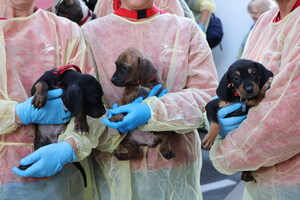North Shore Animal League America Recommends Summer Safety Tips For Dogs And Cats
PORT WASHINGTON, N.Y., July 18, 2011 /PRNewswire-USNewswire/ -- With the forecast calling for an extended stretch of hot weather and high humidity, North Shore Animal League America (NSALA) reminds pet owners to be mindful of the weather conditions and to safeguard their dogs and cats. "It is vital to be aware of the dangers that high summer heat poses for our dogs and cats," advises Gerard Laheney, DVM, of NSALA's Lewyt Veterinary Medical Center. "We need to be proactive as temperatures soar. Panting is an inefficient means of releasing heat and animals do not perspire as humans do. Therefore, they are more prone to feeling the effects of heat than we might realize. For animals, hydration and retreat from sunlight are essential."
(Photo: http://photos.prnewswire.com/prnh/20110718/DC36949)
(Logo: http://photos.prnewswire.com/prnh/20110111/DC27967LOGO)
Dr. Laheney suggests the following hot weather tips for animals:
Never leave your pet in the car. When the temperature hits 70' and 80', temperatures inside a parked car can top over 100 degrees in as little as 10 minutes. While it might be tempting to leave your pet in the car "just for a minute" while you pick up your dry-cleaning, you could be putting his/her life at risk.
Make sure your pet has access to fresh clean water throughout the day. Dogs need to drink more during warm weather, especially after playing or walking outside. You may notice that your dog needs an extra "bathroom break" – aka, outdoor walk, as he or she drinks more water during the summer months. Keep your pets' water bowls cold and filled by adding a few ice cubes each time you refill.
Also, be aware that a thirsty pet may look for water in atypical places and can get into trouble. Chemicals, like garden fertilizer, rat poison, weed killer, swimming pool cleaners, and antifreeze from your car can make their way into pools of water in the yard or driveway, especially after a rainfall. To avoid problems, prevent your pet from drinking from any sources other than a hose or a bowl you've filled yourself.
Preventing Sunburn. Dogs that are at risk for sunburn are dogs with light or white pigmented coats, hairless animals (Chinese Crested, Mexican Hairless), animals with short haircuts, and animals where a medical condition has led to hair loss. Others at risk are pets with allergies/hot spots, cushingnoid, thinning hair coats and animals that have had recent surgery where the surgical area was shaved and prepped.
Minimizing sun exposure for these pets is recommended. However, if they are going to be exposed to longer periods of sun, sunscreen can be applied. Human products are not recommended, because many have ingestion warnings for children that could apply to pets as well. There are products specifically labeled for pets, so those would be best for your animals.
Take it easy. Dogs love the summer months because they go to all sorts of fun places with their people. Keep in mind that your puppy is not going to be good at "pacing himself." You can avoid an animal's risk of heat stroke by doing more strenuous exercise and activity in the morning or evening, when temperatures are cooler. Signs of heat stroke in a dog include heavy panting or labored breathing, bright red gums and tongue (in later stages the gums can turn blue or white), excessive drooling, loss of balance, or sudden lethargy.
Certain breeds, like Brachycephalics, including Pugs, Bulldogs and others with pushed-in noses, plus animals with respiratory and cardiac conditions, are at an increased risk of heat stroke. If you think your dog or cat has heat stroke, call your veterinarian immediately. You can help cool your puppy off by hosing him down with cool water, offering small chips of ice cubes, and wrapping an ice pack in a dishtowel and applying to the dog's body.
Finally, if your pet likes to relax in the shade of a yard or deck, watch out for yellow jackets, bees, toads, and snakes. Bite or sting symptoms are usually swelling of the face or affected areas. Once stung or bitten, the pet's skin may start to look wrinkly or bumpy. This is a first indicator and, if not treated by a veterinarian, could result in death due to toxins taking over and shutting down the body or causing airway swelling to the extent that breathing is impossible.
For more information on pet safety and care, or adopting a shelter animal, visit www.animalleague.org.
ABOUT NORTH SHORE ANIMAL LEAGUE AMERICA
The Animal League has saved almost 1,000,000 lives. As the world's largest no-kill rescue and adoption organization, we understand that a rescue isn't complete until each animal is placed into a loving home. Our innovative programs provide education to reduce animal cruelty, and advance standards in animal welfare. Our staff and volunteers work tirelessly in the pursuit of our vision of a world where all companion animals find permanent homes to end euthanasia. For more information, visit www.animalleague.org.
For More Information Contact:
Cara Taback
North Shore Animal League America
Phone: 516.883.7636
Cell: 516.840.0066
E-mail: [email protected]
SOURCE North Shore Animal League America
WANT YOUR COMPANY'S NEWS FEATURED ON PRNEWSWIRE.COM?
Newsrooms &
Influencers
Digital Media
Outlets
Journalists
Opted In




Share this article